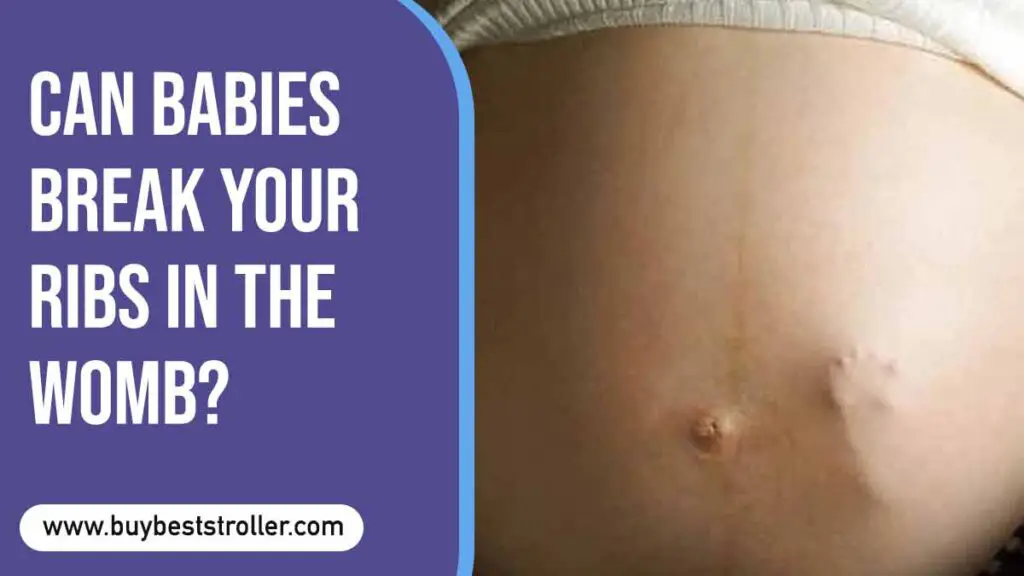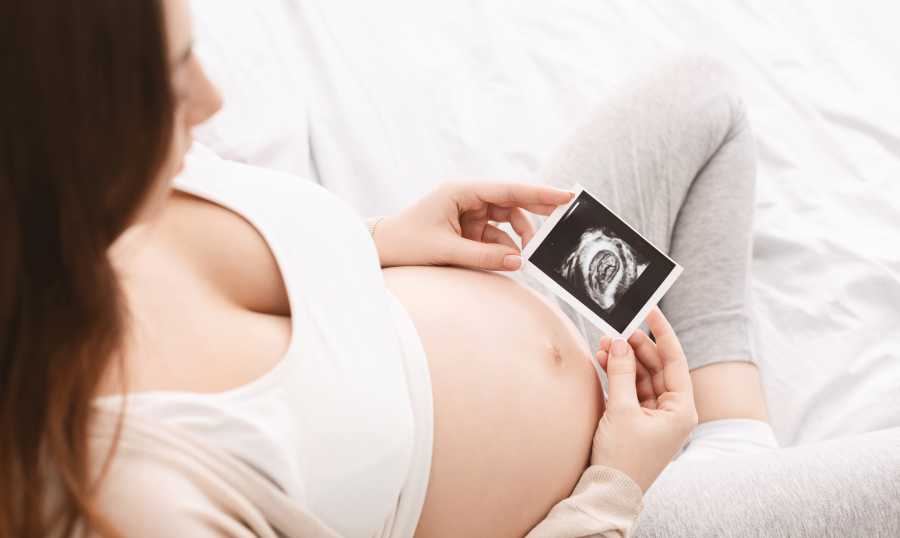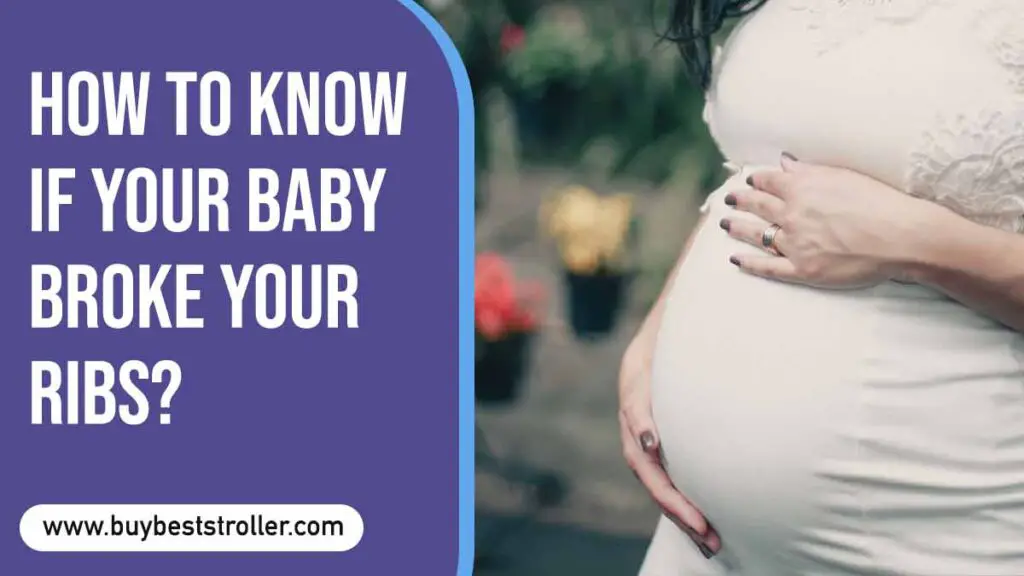Feeling a sudden, sharp pain in your ribs can be highly unpleasant, especially if you’re already experiencing the general aches and pains that come with pregnancy. You were probably aware that your baby would change your body somehow, but Can Babies Break Your Ribs In the Womb? And is it possible that your baby was responsible for causing it?
Although they may be small, your baby can indirectly Bruise or even fracture your ribs from the womb during pregnancy.
It is pretty uncommon for your ribs to break due actually to pregnancy. However, bruised ribs and general rib pain are common pregnancy symptoms, especially in the third trimester, because of how your body changes.
Although it is difficult to tell, there are specific methods you can use to figure out whether your baby has broken one of your ribs. Additionally, this article provides insight into what you can do to alleviate the pain.

Can a baby break your ribs during pregnancy?
Even if you picture your unborn child as a karate master, breaking your ribs with the force of their kicks, that’s not quite how it works.
The most common rib problems in pregnancy are not caused by the baby’s movement, which is insulated by amniotic fluid and the uterus. Therefore, your baby will be unable to apply enough force to your ribs to break them because of these physiological changes.
You might not think it’s possible, but women have broken rib fractures while pregnant. However, you are more susceptible to stress fractures or a complete break in your rib cage because of some bodily changes during pregnancy, including loosening joints and an enlarging uterus.
With the extra weight and baby pushing down on your abdomen, it becomes easier for a rib to become dislocated or fractured.
If you fit any of the following descriptions, you could have a stress fracture in one of your ribs: being naturally tiny, having an inadequate diet, or suffering from a severe coughing fit while pregnant.
But what exactly is a stress fracture?
If you’re wondering whether your rib is bruised or broken, only an x-ray or doctor’s examination can give you a definitive answer.
However, the symptoms of both bruised and fractured ribs are similar (pain and tenderness in the area; pain while breathing; possible bruising), as is the treatment (pain medication to help with swelling and lots of rest). Therefore, knowing whether your rib is broken usually isn’t necessary for effective treatment.
How to identify if you have broken ribs?
A few symptoms will appear if you have broken ribs. You might notice:
- Painful bruising where the rib is broken.
- Breathing pains
- Pain that gets worse when you move, such as twisting or stretching
- You may feel more pain around the area of the broken rib.
How to know if your baby broke your ribs?
A change in the type of pain you’re feeling is one of the first signs that your baby has broken your rib. While your lower ribs might be a little sore during the third trimester of pregnancy, a fractured rib will produce much more severe, sharp, and localized discomfort.
Broken ribs are frequently excruciating to breathe and cough, and you can observe bruising around one area of your rib if it fractures.
For example, a fracture might also produce a sharp pain in your stomach when you bend or twist your waist, although the only way to tell for sure whether or not your rib is fractured is to get an X-ray or CT scan.
However, because radiation can harm your developing baby, doctors may hesitate to recommend these treatments during pregnancy.
If your doctor is concerned it’s a severe fracture, he may suggest an x-ray to ensure everything is OK.

Should You Go To The Doctor For A Broken Rib?
Many individuals put off going to the doctor for various issues because they believe that doctors can do nothing. While it’s true that physicians can’t mend your ribs, and there isn’t much they can do, you should still visit the doctor if one of your ribs is fractured.
This is critical because fractured ribs can cause a variety of issues. For example, if the rib is broken in a specific location or facing a particular way, it may pierce your lung.
Depending on which rib is harmed, broken ribs might cause significant damage to other organs. It’s usually safer to be cautious than sorry.
Your doctor can also offer you some helpful advice on how to get better. For example, they could be able to provide pain medication. For example, a doctor may request lab tests to ensure that you don’t have any vitamin deficits.
Some patients are given a tiny, plastic piece of equipment with a hose that they breathe into to assist them in achieving deeper breathing to avoid pneumonia. Doctors also provide helpful information.

Rib pain during pregnancy
Most of the rib discomfort you feel during pregnancy is due to modifications in your body. For example, ligaments relax and stretch due to hormonal changes, which may irritate the tissue surrounding your expanding ribs. As a result, your breasts develop throughout pregnancy, which may alter your posture and put additional strain on your ribs.
If the pain you are experiencing is sharp and concentrated explicitly in one area, or if there is bruising present on your ribs, you may have a bruised or broken rib. This would be separate from typical pregnancy-related rib pain.
Pains in the ribs during the first trimester
Rib pain is uncommon during the first trimester of pregnancy, although it can happen. The most probable reason this early in the game is your growing breasts: their larger size and additional weight might cause your posture to be altered, causing your back and ribs. Relaxin, a hormone that relaxes joints during the first trimester, may loosen your joints and cause your ribs to ache.
Second-trimester rib pain
At the beginning of your second trimester, you will probably not experience any pain in your ribs. However, as your baby grows more prominent towards the end of the trimester, you may feel pressure on your ribs.
Your belly is growing upward and pressing your lower ribs. And to make matters worse, many babies flip upside-down in the second trimester, putting your lower ribs at risk for your child’s kicks.
During the second trimester, you might feel round ligament pain; as your uterus grows more prominent, it puts pressure on the ligaments that connect your uterus and groin, causing sharp pain around the ribs, back, or pelvis.
Pain in the ribs during the third trimester
Rib flaring can become almost constant during the third trimester of pregnancy. Your baby is pushing upward beneath your ribs, causing them to spread out; your heartburn is out of control; the hormone relaxin is rising in preparation for delivery; and, as you can imagine, your stomach is enormous and completely disrupting your posture.
During their third trimester of pregnancy, women are more likely to get a UTI (urinary tract infection).
A UTI causes kidney pain, but the discomfort is generally mistaken for muscular discomfort owing to the kidneys’ location.
For example, if you’re experiencing a fever or chills with rib soreness or a burning sensation when peeing, see your doctor and get checked for a UTI.

How to Avoid Pregnancy-Induced Rib Pain
If you are currently pregnant and experiencing pain, there are some things you can do to find relief. However, the best way to avoid discomfort is to be proactive and prevent it from occurring in the first place.
For example, if you want to keep your ribs healthy and free of pain during pregnancy:
- Keep your spine naturally straight. –Although it may be inconvenient, sitting up straight might assist in lessening the pressure placed on your ribs, lowering discomfort. Good posture can also aid in the reduction of pain in your neck and upper back.
- It doesn’t take an expert yogi to benefit from yoga – Pregnancy yoga can help you stay flexible and strong throughout your body’s twists and turns.
- Deepen your breathing – Breathing exercises not only may help you relax, but they may also aid in developing core muscles that keep your ribs in place.
- The correctly sized bra is essential – Choose a nursing or pregnancy bra that gives support and can help distribute the new weight of your more prominent breasts. Please avoid underwire bras, which might add unwanted pressure to your sensitive chest area.
Make your bedroom as comfortable as possible by adding pillows to the room’s corners.
A pregnancy pillow or footrest can help you sleep comfortably with your growing baby bump and keep your body in proper alignment.
Why does it feel like my baby is in my ribs?
In the third trimester, your uterus expands and rises under your rib cage. So if it feels like your baby is kicking underneath your ribs, that’s probably because they are! This pressure against the backside of your ribs from a moving fetus is called a “lightning crotch” because it can be pretty painful.
If you’re not far along in your pregnancy, what you’re thinking are your baby’s kicks to your ribs might be heartburn. Heartburn can cause so much pressure in your chest that it feels like someone is digging into your ribs.
Final Words
You’re far more likely to suffer cracked ribs while you’re expecting. However, this doesn’t happen due to the baby kicking hard enough to break your ribs. Other factors make you more vulnerable to this type of harm. Fortunately, most individuals recover correctly without issues.


